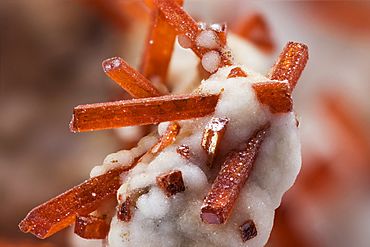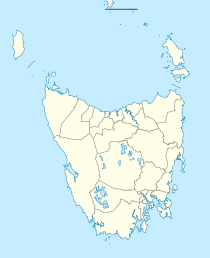Dundas, Tasmania facts for kids
Quick facts for kids DundasTasmania |
|
|---|---|

Dundasite (white) and Crocoite (orange/red)
|
|
| Postcode(s) | 7469 |
| LGA(s) | West Coast Council |
| State electorate(s) | Braddon |
| Federal Division(s) | Braddon |
Dundas was once a busy mining town in Western Tasmania, Australia. It was known for its rich mineral deposits, especially silver. Today, Dundas is no longer a separate town. It is now considered part of the nearby area called Zeehan.
Contents
Where Was Dundas?
Dundas was located about 5 kilometres (3 miles) east of Zeehan. It was also nearly 10 kilometres (6 miles) west of the Mount Read township. The area is very hilly and covered in thick forests. This made it a beautiful but sometimes dangerous place, especially during bushfires.
Weather in Dundas
Because Dundas was close to Mount Read, it often had heavy rain and cold weather. This was a common challenge for the miners and residents living there.
Dundas Post Office and Newspaper
The first post office in the area opened on November 22, 1890. It was first called Mount Dundas Post Office. In 1892, its name was changed to Dundas. The post office stayed open until 1930.
Dundas also had its own newspaper. It was called the Zeehan and Dundas Herald. This newspaper was published from 1902 to 1922. It was an important source of news for the people living on Tasmania's west coast.
Mining and Minerals in Dundas
Silver was first found in the Dundas area in 1890. This discovery led to a mining boom. The Dundas mining area soon became linked with the larger Zeehan mining field.
Many mines around Dundas were famous for their rare and special minerals. Here are a few examples:
- Adelaide Mine: This mine was known for amazing samples of crocoite (a bright orange-red mineral) and stichtite (a purple mineral). It also had other unique minerals.
- Comet Mine: At the Comet Mine, miners found minerals like anglesite, ankerite, and cerussite.
- Dundasite: A special mineral called Dundasite was actually named after the town of Dundas! It is a white or pale blue mineral.
- Hecla Mine: Also known as Hecla Curtin Mine, this site was a place where aikinite was found.
 | Toni Morrison |
 | Barack Obama |
 | Martin Luther King Jr. |
 | Ralph Bunche |


